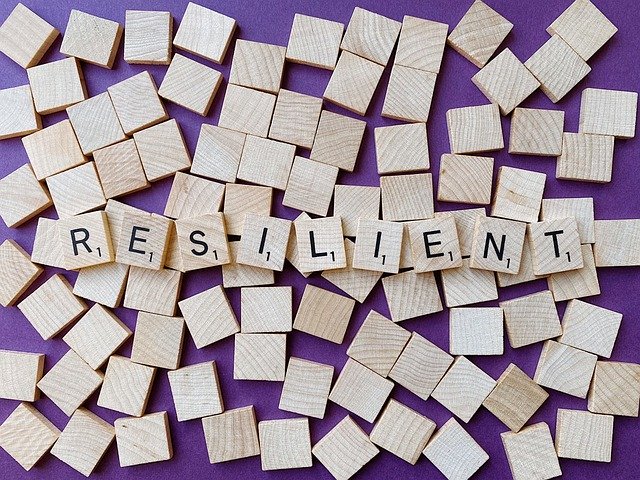Acceptance and Resilience: Secret Ingredients to Online Teaching

With the pandemic, we are living in a strange time. We never imagined that most of us would have to wrap up our classrooms and offices to small corners of our homes. Usually humans strive to keep things normal and as they are. We put effort to be comfortable with how we feel about things, spaces and even people around us. But now is the best time to understand this change, and a change that is happening at an accelerated pace. We have a new culture where we have to embrace adaptability, flexibility and autodidact.
The most influential habits to cope with rapidly changing scenarios are acceptance and enduring resilience.
Acceptance will require us to embrace the changing situation in totality, not just to be “okay” with it or play the blame game. Jon Kabat-Zinn stated, “Acceptance is a very active process, there is nothing passive about it, it’s not passive resignation but an act of recognition that things are the way they are… Acceptance doesn’t mean we can’t work to change the world, or circumstances, but it means that unless we accept things as they are, we will try to force things to be as they are not and that can create an enormous amount of difficulty.”
Accepting the situation, and building resilience are the two habits that can be a game changer. We can empower the younger generation to cope with such situations and be shaped positively by them.
Resilience is defined by Riley and Masten (2005, p. 13) as “referring to patterns of positive adaptation in the face of adversity,” and by Masten et al. (1990, p. 426) as “the process of, capacity for, or outcome of successful adaptation. Academic Resilience leads to better behavior and positive results for disadvantaged pupils.
Build a “Good Rapport”
The Resilience Framework for schools, originally developed by Angie Hart and Derek Blincow (2007) talks about the idea of belonging with evidences on the approach. The evidences are first hand stories which state students enjoy friendly helpful teachers who also maintain an authoritative style of teaching. Van Uden’s (2014) research study showed two aspects of teacher’s behavior that have positive results: 1) the perception by students that teacher has authority and influence over the class. 2) the perception that teachers trust and has positive regard from the student.
Quality Engagement
Emphasise on Quality time rather than Quantity time. The Youth Research Centre in Melbourne has designed a SEL curricula program – Social and Emotional Learning module which can be taught in schools on a regular basis. Well taught SEL program demonstrate more positive social behaviour among kids and are less likely to engage in risky disruptive behavior or habits (Ashdown & Bernard,2012)
Academic Resilience uses collaborative learning activities to make sure the assignments are designed around positive coping, critical thinking and encourage seeking help.
Strength Based Approach
The terms ‘students health’ and ‘students welfare’ have been replaced by ‘students wellbeing’. Positive psychology emphasizes on ‘fixing what is wrong with the student’ rather than concentrating on what is ‘right’. The whole idea is to shift from a deficit-based approach to strength-based approach, build on capacities and resources for young people. (Seligman & Csikszentmihalyi, 2000)
Train the Mind and the Spirit
Dr Sven Hansen the Founder of The Resilience Institute (2002) states that resilience helps people migrate to different versions of themselves, it liberates the potential in an individual and elevates it to be more effective and whole. The institute talks about the Resilience Spiral in which we must be able to see (insight) where we are and make the adjustment needed (mastery) to self-correct.
Apps for Resilience:
Using apps on a regular basis for improving one’s resilience and mental wellbeing can be a good toolkit to have handy. Listed below are some exapmes.
- Headspace – Available on iOS and Android, works around Meditation and Wellbeing.
- Positive Activity Jackpot – Comes with a Clinical Guide on iOS and Android, fun game which picks up activities for you based on behavioural therapy to build resilience.
- Calm – Available on iOS and Android, is designed for people new to meditation with breathing techniques and other guided practises round sleep and music.
- What’s Up? – Available on iOS and Android, uses some of the best CBT (Cognitive Behavioural Therapy) and ACT (Acceptance Commitment Therapy) methods to cope with negative thinking pattern and simple methods to overcome them.
- Talk Life and KoKo developed by researchers at MIT, provide interaction-based support to help people from various states of distress from bulling to self-harm.
About the Author
 Hardika is a PhD student with Auckland University of Technology. Her PhD topic is overlapping meditation, mindfulness and play techniques to create contemporary digital applications and tools to focus on mental wellbeing. With a decade of corporate experience in the Application and Gaming industry she specialises in areas like User Experience Design, Play Experience Design and Digital Edutainment. She enjoys multidisciplinary approach to solve challenging problems and is updated with the latest tools and methods used in various companies.
Hardika is a PhD student with Auckland University of Technology. Her PhD topic is overlapping meditation, mindfulness and play techniques to create contemporary digital applications and tools to focus on mental wellbeing. With a decade of corporate experience in the Application and Gaming industry she specialises in areas like User Experience Design, Play Experience Design and Digital Edutainment. She enjoys multidisciplinary approach to solve challenging problems and is updated with the latest tools and methods used in various companies.

Prasad
June 1, 2020 at 10:35 pm
Insightful articulation by the author. The article explains research based, scholarly meanings of the two ever important habits of mind – acceptance and resilience. These two words have become commonplace in our vocabulary, however, bringing them into action continues to remain challenging. The article provides useful directions towards how that can be done.
Mayur Panchal
June 1, 2020 at 10:36 pm
I recently had the good fortune of reading your article regarding Acceptance and Resilience. It was very well-written and contained sound, practical advice. I want to tell you how much I appreciated your clearly written and thought-provoking article.
While much has been written on this topic, your article expresses the positive facets of acceptance and enduring resilience.
Hardika, please accept my thanks and congratulations on the publication of your first online article. I think the article was a great motivator for many of us who need a little extra push to accept the things & situation as they are.
Thank you for your thorough research and clear writing. I look forward to reading your next informative article. Thanks again for such uplifting coverage.
Thanks & Regards,
Mayur Panchal
-Founder & CEO of The Talentree.
Dr.Jigna Shah
June 1, 2020 at 11:17 pm
Wonderfully compiled
Explanationis simple and understandable
Samir
June 1, 2020 at 11:49 pm
A good initiative at the time of need as most work & 100% education is online due to Prevailing pandemic Situation & the same will prevail till the medicine or vaccine are found.
All the best wishes & good luck.
Janak Vora
June 2, 2020 at 1:11 am
Very nice and informative. Great work Hardika.
Krishna Bhavsar
June 2, 2020 at 1:48 am
Very informative and nicely written content which makes it intresting to read also…great job and hearty congratulations for your first online article..many many many more to come..wish u best of luck
Dr Samita Bhatt
June 2, 2020 at 2:30 am
Very insightful & aptly written considering today’s scenario.
Dr Vijay Galia
June 2, 2020 at 2:45 am
Absolutely to the point ! Immaculately written article.
Thank you for your valuable and timely article. Online education is indeed the future of educational platform which is adopted by most schools and universities globally. It is indeed a challenge and a learning curve to make this new paradigm shift, a success across all age groups.
Dharam Popat
June 2, 2020 at 3:20 am
Brilliant article . Insightful.
Jay Joshi
June 2, 2020 at 3:26 am
Good Article. Yes, we are in the situation where we have to accept and adopt the new way of working and living. We have to be resilient in order to survive and move forward. Mental well being and mindfulness plays a key role in such scenario.
Ujwala Zare
June 7, 2020 at 1:19 am
Excellent article Hardika , mental well-being is necessary in this pandemic period, Good work, All the best for your future , God bless you.
Girish Joshi
June 12, 2020 at 2:31 am
Illustrative apps given , never heard about. Eye opener.
For Indian context how teachers across various grades from I to X should tell their students to use these tools for which subjects , that should be next stage for research and value addition for us in India. Schools in villages, small towns may not be equipped and neither teachers skills as well. Give ideas to upgrade this